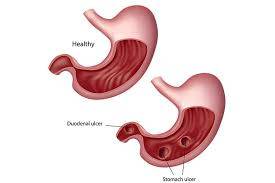Stomach ulcers, also known as peptic ulcers, are open sores that develop on the inner lining of the stomach or the upper part of the small intestine. These ulcers can cause a range of symptoms, including burning stomach pain, bloating, nausea, vomiting, and indigestion. Stomach ulcers are often caused by an imbalance between the stomach acid and the protective lining of the digestive tract, allowing acid to erode the mucosal barrier and create ulcers.
The primary causes of stomach ulcers include infection with Helicobacter pylori bacteria, long-term use of nonsteroidal anti-inflammatory drugs (NSAIDs) such as aspirin or ibuprofen, excessive alcohol consumption, smoking, and high levels of stress. In rare cases, certain systemic conditions like Zollinger-Ellison syndrome, which causes the stomach to produce excess acid, can also lead to ulcer formation.
Diagnosis of stomach ulcers typically involves upper endoscopy, where a thin, flexible tube with a camera is inserted through the mouth to visualize the stomach and small intestine. Blood tests, stool tests, and imaging studies may also be used to confirm the presence of H. pylori infection or rule out other underlying conditions.
Treatment for stomach ulcers aims to relieve symptoms, promote healing of the ulcers, and prevent complications. This may involve medications to reduce stomach acid production, antibiotics to eradicate H. pylori infection, antacids to neutralize acid, and lifestyle modifications like avoiding NSAIDs, quitting smoking, and reducing stress.
Prevention strategies for stomach ulcers include practicing good hygiene to prevent H. pylori infection, using NSAIDs cautiously under medical supervision, limiting alcohol intake, and adopting a healthy diet and lifestyle. Regular medical check-ups and prompt treatment of any symptoms can help prevent complications and promote overall digestive health.
In conclusion, stomach ulcers are a common condition that can cause significant discomfort and complications if left untreated. With proper diagnosis, treatment, and preventive measures, individuals with stomach ulcers can effectively manage their condition and improve their quality of life. If you experience persistent stomach pain or suspect you may have an ulcer, it is important to consult a healthcare provider for timely evaluation and appropriate management.



No comments yet
Be the first to share your thoughts!